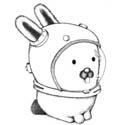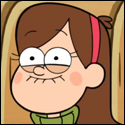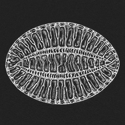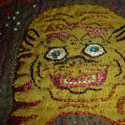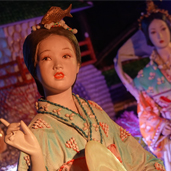|
Have either of you read Piercing and would you recommend it? It sounds really interesting but right now I can't really buy it for less than like $16 or so which seems too much for such a thin book.
|
|
|
|

|
| # ? May 7, 2024 13:34 |
|
I just finished The Narrow Road to the Deep North and Other Travel Sketches, a collection of the travel narratives of Matsuo Bashō. Really nice imagery, and neat to read classical haiku (the only haiku I've really encountered otherwise decorates the front of clever t-shirts).
|
|
|
|
Back in college I took a contemporary japanese lit class led by a prof who absolutely hated Haruki Murakami's work. He dismissed his books as mindless drivel and once had a public debate with Murakami about his writing style. He criticized Murakami for being deliberately vague to the point of detriment, including too many extraneous details that have no bearing on character development or plot, and that he leaves too much up for reader interpretation. Murakami's response was essentially "yep, that's my style." Prof then asked some fairly benign clarifying questions about plot, which Murakami refused to answer other than saying "I want everyone to interpret their own meaning." Big letdown. Now, 7 years later. I've started re-reading Murakami. Just finished Wild Sheep Chase, Wild Sheep Chase, and Kafka on the Shore. I'm trying to gain a new appreciation for them. But my reading is tainted by my prof's opinion. Can't say I've enjoyed them at all. So why is Murakami so popular? His books are highly recommended on these forums. What do people like about them?
|
|
|
|
I'm taking two Japanese literature classes at the moment, one of them is a general survey class where we read Souseki, Kawabata, Tanizaki, Mishima, etc., more or less the list of authors in the first post. I'm also taking a class entirely devoted to Ooe Kenzaburo. We read Nip the Buds Shoot the Kids, A Personal Matter, and The Silent Cry as well as a few short stories of Ooe's, and right now are in the middle of reading A Quiet Life. My professor makes his website with class materials avaliable for the public, which might be of interest to some people here so I'll link it. He also teaches classes on classical (mostly Heian-era) literature, and in fact that's more his interest than modern (although he loves Ooe enough to teach a class on nothing but him). Anyway there's some good general cultural and literary information that he either has on the site itself or links to. As far as Ooe goes, I like his writing, but I'm glad I'm reading him in a literature class setting because his writing is packed full of meaning, and I'm sure I would miss significant things if I wasn't reading it in a class with 20 other people thinking about him. He's also much more interested in Western thought than the average Japanese writer, in A Quiet Life for instance Flannery O'Conner is something of an important element, and we're reading two of her short stories in order to better understand where Ooe is coming from. I gather that the general opinion of Ooe is that A Personal Matter is his best, or at least most important work, and of the three and a half novels I've thus far read by him that was the one that I liked the most (although I am also really liking A Quiet Life). Certainly Ooe's mentally handicapped son has profoundly affected his literature, and knowing that what Ooe himself went through was more or less exactly the same situation as Bird in A Personal Matter makes reading it a lot more poignant, I think. My professor and most of the class seem to think his pinnacle was The Silent Cry, which I didn't like as much, although I did like it and I felt like Ooe was saying something valuable about the human condition. It's just hard for anything to beat the intense personalness of A Personal Matter, I think. Among the authors in the survey class, hands down my favorite was Tanizaki with Sasameyuki. I also liked Souseki's Kokoro and kind of liked Mishima's Temple of the Golden Pavilion. I did not like Snow Country at all I thought it was boring and uninteresting, anathema as that may be in the world of Japanese literature. We were going to read a book by Murakami, but the schedule was changed so we ended up reading Ooe's A Personal Matter instead in the survey class. I don't think that's a reflection of my professor not liking Murakami so much as him really liking Ooe. In the survey class, we entirely read English translations. Most of the reading in the Ooe class is translation as well, but we do from time to time read important sections of the novels in the original Japanese. Every time we do this it takes me a few hours to read and understand maybe six paragraphs worth of text, and I'm not sure how much of this is due to my limited experience with reading Japanese and how much is due to Ooe being a hard author to make sense of.
|
|
|
|
Hyper-Urho-Kekkonen posted:In the survey class, we entirely read English translations. Most of the reading in the Ooe class is translation as well, but we do from time to time read important sections of the novels in the original Japanese. Every time we do this it takes me a few hours to read and understand maybe six paragraphs worth of text, and I'm not sure how much of this is due to my limited experience with reading Japanese and how much is due to Ooe being a hard author to make sense of. Oe is actually sort of a hard author to read in the original, in my experience. I read selections of many of my assignments for Japanese literature classes in the original just for fun all throughout undergraduate and graduate school, including work from Meiji all the way to contemporary stuff and he was among what I perceived to be the harder authors. I also read a novel of his called "Warera no Jidai" which I don't think has been translated into English and remember it being relatively difficult for me.
|
|
|
|
z0331 posted:
If you didn't like Snow Country I would recommend instead Thousand Cranes which I preferred much more and felt it a more lively read and more captivating. It's one of the three that was widely considered his best novels and might be a better starting point. z0331 posted:
Best book to read by Mishima is his first, and I would say almost partly biographical novel Confessions of a Mask. It's the one that really made him famous and the one that delves into his obsessions with homosexuality and aestheticism, it's a really good read and I think the most accessible way to get into his works. I really dig Mishima, he's my favourite author, and I've read most of his stuff but the one I really coming back to is Confessions. I also really liked the Sea of Fertility tetralogy, because it really gets into his head and just the evolution of his own hosed up world view. Mishima's life itself is an interesting read, and if anyone gets into his books I recommend checking out a biography as well. I mean, you know a guy who kills himself by committing seppuku has got to have some interesting things to say. z0331 posted:Jun'ichiro Tanizaki I think Tanizaki's most fun work is The Secret History of the Lord of Musashi which I think vintage sells bundled with Arrowroot since they are both fairly short novellas. Anyone who likes Japanese historical novels should check this one out, it's so gory it's almost a horror novel, really fun stuff. Musashi is basically this great Samurai Lord that has this sexual obsession with severed heads. It's elegantly written splatterpunk. As someone mentioned before in the thread there is a lot of scifi and crime fiction that's been translated to English by some great Japanese authors. I don't know if it's still available but one I really liked was All She Was Worth by Miyuki Miyabe because I felt it had an interesting insight as to how the debt system works in Japan. I didn't realize that in Japan that your ancestor's debt basically gets passed forward, not sure if it still works like that now, but it seemed crazy to me. I heard that a lot of deeper meaning in Japanese literature can't be captured and gets lost in translation because a lot of the authors select specific Kanji that can evoke a few different meanings and so it really layers the reading of the same passage in a way that can't be done when translated to English. I've never studied Japanese but am interested to hear if this is the case.
|
|
|
|
I just saw Autofiction by Hitomi Kanehara in a bookstore; it looked interesting so I picked it up. It's about a young woman with mental health issues. It starts with her at 22 years old flying back to Japan with her husband from her honeymoon. Her emotions are like a yo-yo and she convinces herself the stewardess is plotting to have sex with her husband. After spending some time at the 22 year mark, the novel goes backwards to 18, 16, and finally her at 15 years old. Fairly short, but a pretty enjoyable read.
|
|
|
|
Poutling posted:
Thanks for the suggestions. Seems there's a lot of Mishima love in this thread. I'm reeeeaaalllly slowly working through Temple of the Golden Pavillion in Japanese. It's tough but so far quite rewarding. I really like his descriptions. I'm not good enough at Japanese yet to tell you for sure if a lot is lost in translation, but it wouldn't surprise me at all. Although, I would imagine the art of meaningful kanji selection may be a dying one. Strangely enough, I actually like the thought of being buried in kanji dictionaries that list the varied and archaic subtleties of a character that show more of what the author was trying to express. Reaffirms my decision to apply for East Asian Studies grad school.
|
|
|
|
Poutling posted:I heard that a lot of deeper meaning in Japanese literature can't be captured and gets lost in translation because a lot of the authors select specific Kanji that can evoke a few different meanings and so it really layers the reading of the same passage in a way that can't be done when translated to English. I've never studied Japanese but am interested to hear if this is the case.
|
|
|
|
Black Jasper posted:Back in college I took a contemporary japanese lit class led by a prof who absolutely hated Haruki Murakami's work. He dismissed his books as mindless drivel and once had a public debate with Murakami about his writing style. I'm not surprised he didn't answer. What he intended to write and what the reader got out of it are two different things, he knows that and he doesn't want to interfere with people's interpretations. What I'm basically trying to say is that your prof was a dick.
|
|
|
|
Obligatory Toast posted:I'm not surprised he didn't answer. What he intended to write and what the reader got out of it are two different things, he knows that and he doesn't want to interfere with people's interpretations. mystes fucked around with this message at 21:46 on Apr 22, 2010 |
|
|
|
mystes posted:I imagine that the professor was motivated out a doubt as to whether Murakami himself can actually make sense out of his books' plots (a doubt I share). However this is clearly not worth arguing about since people who read his stories most likely don't care. Nonetheless it can at times be slightly irritating to see an author who is in my opinion a sort of crappier Tom Robbins display such an enormous ego. I like Murakami but I think he's hit or miss. I personally had a really hard time making it through Wild Sheep's Chase and never even finished it, but really loved Hard Boiled Wonderland and the End of the World because I felt like its plot made a lot more sense, kind of a more fantasy less Sci-Fi version of Johnny Pneumonic. However my ultimate favourite book of his isn't even one of his more absurdist ones, it's Norwegian Wood which is the book that really broke him into the bestseller strata in Japan anyway, and has a cult like Catcher in the Rye status over there I hear. I've read both Norwegian Wood and Catcher, the first in my early twenties and the later in my late teens, and I've got to say between the 2 I identified with Murakami's a lot stronger and was really affected by his portrayal of a troubled, confused young man who just doesn't know what he wants with life. I'd say read that one if you want to get a sense of what Murakami is capable of, if you haven't already. I've been meaning to read it again to see how it resonates now that I'm older, more experienced, and less 'disenfranchised', but keep putting it off because my shelf is still so full of books that I haven't yet read 
|
|
|
|
Have you read Sputnik Sweetheart?
|
|
|
|
I've read relatively little of him also. I really liked Hard Boiled... though honestly I'd probably be hard-pressed to accurately explain why. I liked the atmosphere he sets up and the blurring the line between the mental and physical world was interesting. Other than that I've read some of his short stories. I want to say the shorter they are the better because he seems to have a tendency to just trail off.
|
|
|
|
mystes posted:Have you read Sputnik Sweetheart? Yes I read it but didn't like it so much as Norwegian Wood, maybe it's because I'm older and don't really get that whole 'isolated from the world' disaffected youth thing that he seems to be so fond of. What did you think of it? If you haven't read Hard Boiled you should try it, you might like it more than his other stuff.
|
|
|
|
I need to read Mishima, he was an interesting dude by all accounts. Is Temple of the Golden Pavilion a good starting place? The first thing I knew about him was the story of his death, which struck me as profoundly unusual and tragicomic-- for anyone who doesnt know already (emphasis mine)-- wiki posted:On November 25, 1970, Mishima and four members of the Tatenokai, under pretext, visited the commandant of the Ichigaya Camp—the Tokyo headquarters of the Eastern Command of Japan's Self-Defense Forces.[7] Inside, they barricaded the office and tied the commandant to his chair. With a prepared manifesto and banner listing their demands, Mishima stepped onto the balcony to address the soldiers gathered below. His speech was intended to inspire a coup d'etat restoring the powers of the emperor. He succeeded only in irritating them, however, and was mocked and jeered. He finished his planned speech after a few minutes, returned to the commandant's office and committed seppuku. The customary kaishakunin duty at the end of this ritual had been assigned to Tatenokai member Masakatsu Morita, but Morita was unable to properly perform the task: after several attempts, he allowed another Tatenokai member, Hiroyasu Koga, to behead Mishima. drat
|
|
|
|
does anyone else agree that Mishima is the handsomest Japanese author?
|
|
|
|
swamp waste posted:I need to read Mishima, he was an interesting dude by all accounts. Is Temple of the Golden Pavilion a good starting place? Like I said up above in an earlier post I'd start with Confessions of a Mask and go from there, it's his first novel and I think a better starting point. Temple can be a bit long I think Confessions was more gripping and also semi autobiographical if you're really interested in a view into his life and thoughts.
|
|
|
|
Splaa posted:He also wrote Audition, which the movie is based on. I've read a couple of his books and they are always interesting and generally pretty horrific. He's got a bit of a Palanihuk vibe (I don't know if that's a dirty word here, if only for the subject matter. I'd recommend Almost Transparent Blue, but probably skip In the Miso Soup, which has little going for it other than lurid violence. I think you can draw some comparisons to Palanihuk with Ryu, but I feel that although he sometimes seems to take gleeful joy in describing ridiculous stuff, it's not for the shock factor, at least not completely. Piercing has some pretty intense stuff in it, but in the end it comes to a logical, satisfying, almost upbeat conclusion. However, I have not read Coin Locker Babies, and I'm told that in the first sentence a woman puts a baby's penis in her mouth. Acute Hepatitis posted:does anyone else agree that Mishima is the handsomest Japanese author? http://www.kroakys.com/markdevlin/TheMishimaIncident/mishima2.jpg Just look at that dude.
|
|
|
|
drat girl! posted:Kobo Abe doesn't get mentioned enough in discussions on Japanese literature, although it seemed like he was pretty influential in the 1960's and 70's. He reads sort of like a more clinical Franz Kafka. I don't know if it is an issue with the translation, but his writing doesn't really come across as anything more than direct and serviceable, but the ideas behind his novels are innovative and radically different from the Japanese authors of his generation. Bumping this thread (it was the last thread on the last page  ) because, as I posted in the Just Finished thread, I'm getting on a bit of an Abe kick. I really enjoyed Woman in the Dunes and even found myself satisfied with how it ended. I felt like my opinion of life and the village and what they had done changed and developed along with the main character's, so that by the end I agreed with his decision and thought it was probably the best he could have made. ) because, as I posted in the Just Finished thread, I'm getting on a bit of an Abe kick. I really enjoyed Woman in the Dunes and even found myself satisfied with how it ended. I felt like my opinion of life and the village and what they had done changed and developed along with the main character's, so that by the end I agreed with his decision and thought it was probably the best he could have made.I just started The Box Man and I totally agree that it is a challenging novel, and also funny. The narrative (so far, don't know if it changes) is from pages of notes written by a box man. That is, someone who has rejected living like everyone else and instead lives inside of a specially-prepared cardboard box. He spends time musing on certain things like the psychological progression of a dream in which you think you're a fish. I feel that there are connections to be made from these passages to how a box man sees the world but I just am having a hard time working them out. I'm becoming interested in Japanese versions of surrealism and, if I dare to use the term, magical realism, and Kobo Abe is just about the perfect choice for that.
|
|
|
|
Hard-Boiled Wonderland and the End of the World freakin' changed my life in grade five. I remember hiding in the girl's change room at recess reading it because I didn't want to go outside. It's one of those books that I re-read once a year, and it always feels like a new experience every time. Nothing else of his affected me quite so deeply, though I did enjoy Dance Dance Dance, Wind-Up Bird Chronicle and Norwegian Wood. Others like After Dark and Kafka on the Shore didn't hold me at all for some reason; I think he spends a little too much time circling around the drain. Or maybe the timing just wasn't that great. Much has been made of Murakami's accessibility to Western readers. I love Earthbound (no surprise that Itoi and Murakami are best buds, apparently) and Deadly Premonition, so I think I may just have a weakness for stories that include aspects of Western culture as seen through Japanese eyes. There's something about the two modern cultures that is similar and yet weirdly skewed when they start reflecting each other like two fun house mirrors placed across from one another. I'll admit I often read Japanese lit, not to broaden my cultural horizons, but to look around at the same old scenery with the added filter of a stranger gazing longingly at it from across the ocean- The way we in the West tend to do to Japan. (I've also been watching a lot of Lynch, who has a fixation with Eastern spirituality, so the cycle continues. Similar to Murakami, you won't find Lynch disclosing the meaning behind that red lampshade, or even get him to admit he put it there deliberately.) This Kobo Abe sounds like he might have some works up my alley.
|
|
|
|
From what I've read so far, you won't find much in the way of obvious western references in Abe's works. You can, of course, find influences from the war and western culture in general, but it's not going to be like Murakami. Just finished The Box Man and it was not at all what I was expecting. The question of narrator and identity was impossible to work out from the first read through. At certain points I was convinced certain characters were the same person, but then the next section would throw it back into question. I'm especially not sure what to make of the ending. I can't even tell if I should be optimistic, or horribly depressed. Has anyone else read this?
|
|
|
|
I might give The Box Man a try next, since it's in my pile. I'm just finishing A Pale View of Hills by Kazuo Ishiguro; I decided to read all his books in sequence (I've only read The Unconsoled, but that was a long time ago.) This thread has helped introduce me to a few Japanese authors, but I've already read nine of Haruki Murakami's novels, a couple each by Kenzaburo Oe, Ryu Murakami, Yasunari Kawabata, and a few by Kobo Abe and Yukio Mishima. I was actually put off by Mishima's Runaway Horses because I found the underlying philosophy repulsive, which spoiled the tetralogy for me. I might try it again another time. Good stuff, though. I needed a rest from Japanese literature, but I guess I'm back for more.
|
|
|
|
I just finished The Box Man, and it's now my favorite Japanese novel. It's very weird and entertaining, with metaphor piled on top of metaphor in an almost self-mocking way. It's quite a fractured juggling act as we're led both literally and figuratively through layers of alienation.z0331 posted:I'm especially not sure what to make of the ending. I can't even tell if I should be optimistic, or horribly depressed. IMO the ending strikes a necessary note of ambiguity. The issues that are addressed in this novel are after all central to the human condition and can never be resolved. If books can make you horribly depressed, then screen them for nihilistic tendencies. This one is pretty dark, but I have a taste for it. Not everyone does, or should. Just my take on things. Wrojin fucked around with this message at 08:45 on Sep 7, 2010 |
|
|
|
The issue I had with it, though, was the question of identity. I definitely have to read it again as the line between the characters got seriously blurry. Also, how did you interpret the ending in a more literal sense? What was the deal with that alleyway the woman apparently disappeared down? At that point I wasn't sure if I should take it metaphorically, literally, or simply a figment of his imagination. I don't have the book in front of me otherwise I'd reread the last few pages right now since I'm thinking of it.
|
|
|
|
z0331 posted:The issue I had with it, though, was the question of identity. I definitely have to read it again as the line between the characters got seriously blurry. You can think of this as kind of an expressionist painting, only done in the form of a novel. It doesn't need to be strictily representational -- in fact, its strength is that it pushes beyond those limitations. (Again, this is just my take. I firmly believe that there is no "right way" to respond to art. It's a personal thing, or worthless. One or the other.) z0331 posted:Also, how did you interpret the ending in a more literal sense? What was the deal with that alleyway the woman apparently disappeared down? At that point I wasn't sure if I should take it metaphorically, literally, or simply a figment of his imagination. Like I said, I really enjoyed this novel. I look forward to reading it again in a year or two and probably getting a different reaction from it. It's that kind of book.
|
|
|
|
Wrojin posted:I was actually put off by Mishima's Runaway Horses because I found the underlying philosophy repulsive, which spoiled the tetralogy for me. I might try it again another time. Resurrecting my own thread because I'm just about finished with this book and, as I was reading it, it suddenly struck me that it reads almost like a Tea Party fanfic in that you have a group of people who consider themselves the embodiment of truly pure patriotism and who want to restore the country to the control of the divine emperor. Granted there are some ideological differences, but while reading it I couldn't stop thinking about the more hardcore Tea Partiers who daydream about leading a rebellion to overthrow the corrupt government, expelling socialism and all other forms of evil, and restoring America to the of the divinely-inspired Constitution. That said, I'm not really sure what to make of Isao. To be honest, he just seems like a smart, but extremely naive youth who makes the common youthful mistake of truly believing he is better than everyone else. I have had absolutely no sympathy for him at all over the course of the book, and really just find him pitiable. I haven't finished it yet, but, Wrojin, I was wondering if the philosophy that turned you off was this brutal nationalism, and if you thought the book was actually supporting it or not.
|
|
|
|
I just finished my first Murakami book, The Wind-Up Bird Chronicle. I really enjoyed it, at least until I found out that the English 'translation' is really a 'translation and adaptation.' A little rooting around showed that something like 25K words have been cut from the English translation, including several whole chapters. I HATE ABRIDGED BOOKS. But at least most have the decency to state that they are abridged on the cover or back. I don't regret reading it or anything, and apparently the chapters taken out don't take away too much from the overall story, but goddamn I'm pissed. I guess the only 'real' version of the story is exclusively in Japanese though, and there's no way I'm going to learn that any time soon (Chinese is hard enough). I apologize if this seems pedantic, but I take pride in reading unabridged books and it bothers me that publishers would do this to such an outstanding narrative. I'm going to read Kafka by the Shore next. Thankfully the inside copyright page only says 'translation' instead of 'translation and adaptation.' I guess I'm just going to have to be that much more careful now. Edit: Oh yeah, I also recently picked up Royall Tyler's Penguin Classic Japanese Nō Dramas. It's 24 famous Nō plays along with footnotes and stage directions. I don't know one thing about Nō drama, but it sounded cool so I guess I'm about to learn. Automatic Jack posted:(I've also been watching a lot of Lynch, who has a fixation with Eastern spirituality, so the cycle continues. Similar to Murakami, you won't find Lynch disclosing the meaning behind that red lampshade, or even get him to admit he put it there deliberately.) Ha, as I was reading The Wind-Up Bird Chronicle I kept thinking of David Lynch. Foyes36 fucked around with this message at 20:09 on Nov 4, 2010 |
|
|
|
There's a fairly interesting e-mail exchange with the translator where he mentions the cut portions of TWUBC. http://www.randomhouse.com/knopf/authors/murakami/complete.html
|
|
|
|
taser rates posted:There's a fairly interesting e-mail exchange with the translator where he mentions the cut portions of TWUBC. "and scholars can have a fine time screaming about how Jay Rubin utterly butchered the text." - Jay Rubin Eh, I'm screaming about it now, though I don't think he necessarily 'butchered' the text. I just sort of want to know what I missed out on. Wikipedia has a little summary of the cut portions, but it'd be nice if they could release the translated chapters online or something (though I know copyright issues would probably nix doing this for free). Another question: So is the mysterious woman that calls Toru in the beginning supposed to have been Kumiko the whole time? Foyes36 fucked around with this message at 00:12 on Nov 5, 2010 |
|
|
|
Pfirti86 posted:Edit: Oh yeah, I also recently picked up Royall Tyler's Penguin Classic Japanese Nō Dramas. It's 24 famous Nō plays along with footnotes and stage directions. I don't know one thing about Nō drama, but it sounded cool so I guess I'm about to learn. In my opinion, Noh plays are like opera in many ways. (Warning: I know very little about opera) For one, no one can actually understand what's being said. The chanting vocalizations are pretty amazing to listen to, but even Japanese people don't know what the gently caress. Second, the vast majority of them can be divided into a few standard story-types which the book you bought will probably explain. That said, you can find references to them in a lot of classical and more modern Japanese literature, just like western lit often references famous operas or plays. I'd be curious, though, how it is to read them rather than see them.
|
|
|
|
Thanks OP. I've been wanting to read Mishima for a long time, and especially since seeing Mishima: A Life in Four Chapters last summer. But, I never knew exactly where I was going to start. I think I have a better idea on where now. As for my favorite authors of Japanese Contemporary Literature, I'll have to bring up Koji Suzuki author of the Ring Trilogy, a dark satire on the Japanese Media Machine as well as the power of an idea. He's also written few other novels translated and available in the US. I find his writing style, nicely fluid which is probably helped by good translations of his works.
|
|
|
|
Finally finished Mishima's Runaway Horses and to the very end I still didn't feel any sympathy for the main character and I'm still not even sure if I was supposed to. I get the idea that he wanted to embody a purity of thought that made no compromises to silly things like the real world and how poo poo actually works, but it just made him seem to me more like a petulant child than an uncorruptable martyr. Again, though, I'm not sure if that's because of cultural differences. I'll probably getting around to reading the rest of the tetralogy, but I kind of like Honda and don't really want to watch him destroy himself. z0331 fucked around with this message at 06:45 on Nov 26, 2010 |
|
|
|
z0331 posted:That said, you can find references to them in a lot of classical and more modern Japanese literature, just like western lit often references famous operas or plays. I'd be curious, though, how it is to read them rather than see them. Noh is an astoundingly beautiful artform, but when read it will tend closer to poetry than a novel or a modern play. Yeats wrote At the Hawk's Well in an Irish-inspired imitation of the Noh, and poets like Pound followed suit, so in a way Noh in its written form has a fairly weighty influence on the development of English language modernism (with much other literature from Asia). The most gorgeous translations come from Ezra Pound via Fenollosa in Noh' or Accomplishment: a study of the classical stage of Japan . You can find a lot of them online too.
|
|
|
|
Pfirti86 posted:I just finished my first Murakami book, The Wind-Up Bird Chronicle. I really enjoyed it, at least until I found out that the English 'translation' is really a 'translation and adaptation.' A little rooting around showed that something like 25K words have been cut from the English translation, including several whole chapters. I feel the same way. I loved The Wind-Up Bird Chronicle and was pretty disturbed when I read that a lot of it was cut out(which made a lot of sense in retrospect). But I'm in the process of learning Japanese so I hope to be able to read it in a year or three. Though, is there anyone here who can tell me how well you should be able to read Japanese before trying out a book(with a dictionary of course)? Personally I thought Kafka on The Shore was ridiculously stupid, especially compared to Wind-Up Bird Chronicles. I prefer when Murakami keeps his surrealism somewhat subtle. Also, I can't believe how many people in my Japanese class have only read(and still only read) Murakami novels. I like some of his stuff just fine but he's definitely not as good as everyone in my class makes him out to be. Hell, no one in my year has read Mishima or heard of Kobo Abe or anyone other than Murakami. It's ridiculous. Then again, these are the same people who think Naruto has some deep philosophical meaning(not that everyone in my class is a rabid otaku, but many are). NeilPerry fucked around with this message at 15:28 on Nov 20, 2010 |
|
|
|
NeilPerry posted:Also, I can't believe how many people in my Japanese class have only read(and still only read) Murakami novels. I like some of his stuff just fine but he's definitely not as good as everyone in my class makes him out to be. Hell, no one in my year has read Mishima or heard of Kobo Abe or anyone other than Murakami. It's ridiculous. Then again, these are the same people who think Naruto has some deep philosophical meaning(not that everyone in my class is a rabid otaku, but many are). I didn't read Murakami until after reading quite a bit of Soseki and Akutagawa, along with Heian literature like Murasaki Shikibu and Sei Sonagon. It's crazy that people would avoid all these other great authors. I think Mishima's next. I ended up not reading Kafka by the Shore; this Noh collection is taking plenty of time.
|
|
|
|
Pfirti86 posted:I didn't read Murakami until after reading quite a bit of Soseki and Akutagawa, along with Heian literature like Murasaki Shikibu and Sei Sonagon. It's crazy that people would avoid all these other great authors. I think Mishima's next. Murakami is a very important writer for Japanese literature as he's been able to do what a lot of Japanese authors could not do(gain almost unanimous international acclaim), but to me it's more pop literature(I don't know what else to call it) than anything else. I would like to tackle on Noh someday soon but I've just ordered The Woman in the Dunes and have a ton of other books lying around. But how is "Japanese Nō Dramas" up till now?
|
|
|
|
NeilPerry posted:I feel the same way. I loved The Wind-Up Bird Chronicle and was pretty disturbed when I read that a lot of it was cut out(which made a lot of sense in retrospect). But I'm in the process of learning Japanese so I hope to be able to read it in a year or three. Though, is there anyone here who can tell me how well you should be able to read Japanese before trying out a book(with a dictionary of course)? You should be pretty comfortable with grammar and especially kanji (the more painful of the two to have to look up, generally). I don't have Wind-Up Bird, but here's the first couple paragraphs from Murakami's Pinball, 1973 that I have on hand so that you can get an idea of his writing style and how hard it is for you: 見知らぬ土地を聞くのが病的に好きだった。一時期、十年も昔のことだが、手あたり次第にまわりの人間をつかまえては生まれ故郷や育った土地の話を聞いてまわったことがある。他人の話を進んで聞くというタイプの人間が極端に不足していた時代であったらしく、誰も彼もが親切にそして熱心に語ってくれた。見ず知らずの人間が何処かで僕の噂を聞きつけ、わざわざ話しにやって来たりもした。 He writes a hell of a lot more plainly than some Japanese authors, which should make him a lot more accessible when you're ready for adult literature. Might want to cut your teeth on some stuff aimed at junior high kids or so first, after you're comfortable just reading through manga for fun rather than meticulously studying it. (If you're still at the point where you haven't really read ANYTHING, I recommend よつばと, the first thing I was ever able to read 100%) Something I would VERY STRONGLY recommend is completing Kanji Damage or similar before even trying. No furigana in this poo poo (this is a lie. I flipped through and saw a number "3" with the furigana スリー beside it, but that was the only one). Meticulously trying to write out unknown kanji is a BITCH after you do it for the fifth time on a single page. And if you don't have an electronic dictionary to write them by hand then just forget about even trying. Learning just the meanings and onyomis from Kanji Damage lets you make a valiant guess at possible meanings/readings of a jukugo, and the more kunyomis you can remember, the better, since it makes it WAY easier to look them up. For example, when I typed that up just now I didn't know the word 極端, but I knew that 極 was probably きょく and 端 was probably たん, so I tried that and it worked, without having to write the fuckers out in my dictionary. Also, even if you've never written it before, being able to recognize the parts makes it way easier to process and write than looking back and forth and back and forth and copying strokes. Sorry this post got kind of excessively long, but I hope that I've answered the question!
|
|
|
|
Mind Ape posted:Noh is an astoundingly beautiful artform, but when read it will tend closer to poetry than a novel or a modern play. Yeats wrote At the Hawk's Well in an Irish-inspired imitation of the Noh, and poets like Pound followed suit, so in a way Noh in its written form has a fairly weighty influence on the development of English language modernism (with much other literature from Asia). The most gorgeous translations come from Ezra Pound via Fenollosa in Noh' or Accomplishment: a study of the classical stage of Japan . You can find a lot of them online too. This is really interesting. I never knew there was such a connection between western playwrites and Noh. Not that I know much about Noh anyway... Do you have any favorite Noh plays? Have you ever seen one live? I was able to see one and I just remember how striking it was in its minimalism. Also, thanks for mentioning Fenollosa. I didn't know about him but, after looking him up, I'd say he's a pretty important guy to know about when planning on studying Japanese literature. Edit: Apparently his work, Epochs of Chinese and Japanese Art has a Kindle version which is really surprising and awesome. z0331 fucked around with this message at 06:44 on Nov 26, 2010 |
|
|
|

|
| # ? May 7, 2024 13:34 |
|
Poutling posted:I think Tanizaki's most fun work is The Secret History of the Lord of Musashi which I think vintage sells bundled with Arrowroot since they are both fairly short novellas. Anyone who likes Japanese historical novels should check this one out, it's so gory it's almost a horror novel, really fun stuff. I know it's a totally different book, but I just ordered a copy of Yoshikawa's "Musashi" and if that severed heads thing is also the case in my book then I'll eat up 970 pages of that no problem.
|
|
|








